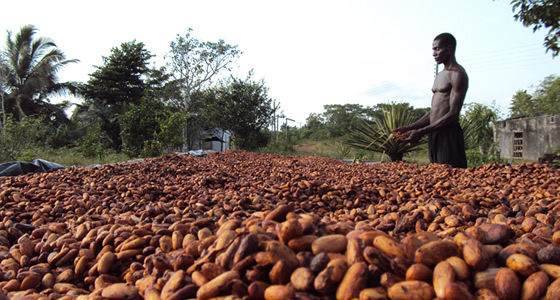
Ivory Coast cocoa sector regulator will not allow bean grinders to accumulate stocks beyond authorised limits during the main October to March harvest to ensure fair access amid fears of a supply shortage.
Cocoa futures have hit record highs due to forecasts for a drop in production, particularly from Ivory Coast and Ghana, the world’s top two producers that account for more than 70% of world output.
Ivory Coast’s main crop is expected to fall by around 25% this season compared with the previous season due to poor weather.
Ivory Coast cocoa exporters and bean grinders have a purchasing limit each year in line with their export contracts. But the regulator – the Coffee and Cocoa Council (CCC) – allows grinders an exemption so they can stockpile enough beans to cover 45 days of grinding operations.
This gives them an advantage over other traders, ensuring a steady supply of beans to maintain their operations without interruptions.
But given the current context, the exemption will be unfair to exporters who will struggle to access necessary volumes to fulfil their export contracts, Yves Brahima Kone, managing director of the CCC told Reuters on Friday.
“We will not allow bean processors to purchase beyond the purchase limit this year because everyone may not be able to get the cocoa they need,” Kone said.
“We are forced to make this difficult decision. There won’t be enough cocoa for everyone,” he added.
Grinders are worried that without the ability to stockpile beans they may not have enough to grind and cover their own export contracts.
Some Ivory Coast grinders told Reuters that the decision will affect their production. They had been operating at full capacity for the past two seasons as cocoa grind dips in Europe due to operational costs.
European bean grinders have reduced grinding capacity and asked their branches in Ivory Coast to significantly increase monthly grinding volumes to compensate.
As a result, the monthly average of Ivory Coast cocoa grind has increased steadily, and reached nearly 60,000 metric tons per month in September from around 45,000 tons in 2019/2020, according to data from Ivory Coast exporters association GEPEX.
This association includes major bean processors such as Cargill (CARG.UL), CEMOI, OLAM (OLAG.SI) and Barry Callebaut (BARN.S).
“With the gas and electricity crisis in Europe, it has become much more profitable to grind cocoa locally in Ivory Coast, which had led us to accelerate the pace here since 2021,” said a director of grinding plant in San-Pedro, who requested anonymity to speak candidly.
Ivory Coast has a total grinding capacity of 712,000 tonnes. It vies with the Netherlands for the spot of leading grinder globally. In the past two years, grinding in Ivory Coast reached record highs, with a record of more than 700,000 tons achieved last season.
“Our stocks are replenishing very slowly, and if we cannot purchase beyond the authorised limits, it will be catastrophic for all bean grinders,” said a manager of another processing plant.
Source: reuters.com























